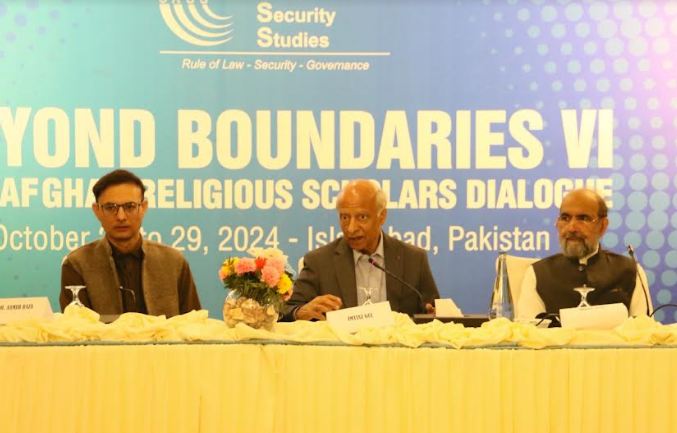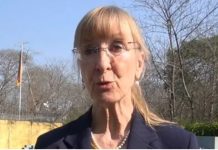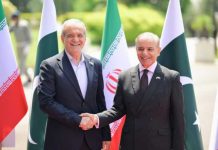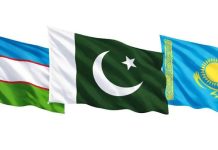ISLAMABAD, OCT 29 /DNA/ – Respect for the writ of the state is the prerequisite for any dialogue or negotiation between the state and group or individual. No state negotiates with terrorists; Tehreek-e Taliban Pakistan (TTP) – declared as Fitna al Khawarij by the government of Pakistan – has contributed to severe violence in the country, including attacks on civilians and community elders and security forces. While the TTP’s presence in Afghanistan is an acknowledged reality, Pakistani stakeholders believe that the Taliban government could play a constructive role in addressing this threat to Pakistan’s national security and its relationship with Afghanistan.
The remarks were made by the former chairman of the Council of Islamic Ideology Dr. Qibla Ayaz, currently amember of the Shariat Appellate Bench of the Supreme Court (SC), during the 5th round of Pak-Afghan Religious Scholars Dialogue held in Islamabad by the Center for Research and Security Studies (CRSS).
In the context of education, Dr. Ayaz highlighted that internationally accepted educational models, such as Indonesia’s, could be adapted in Afghanistan to provide a curriculum that aligns with both sharia guidelines and modern standards, without requiring an extensive overhaul. This approach was suggested as a pragmatic response to the complexity of revising hundreds of books. The Afghan government must consider the international asks on the matters of girls and women rights to work and education; reversing restrictions on their fundamental rights can actually pave way for their recognition by the global communities including states and citizens, whereas conditioning education on international recognition will create more obstacles to the acceptance and might even risk reducing international aid and support to the country already undergoing severe humanitarian crisis.
The participants acknowledged that terrorism is a common threat and underlined counter-terrorism cooperation between two sides to jointly tackle the threats to both sides’ national as well as regional security. They appreciated the initiatives like Iqra in Kabul and Aazmaish in Kunduz and suggested to resume education for girls and women while replicating these models of education successfully running in Afghanistan to bridge the gap between the opportunities for education on offer by the state and educational needs of the female members of community.The participants suggested to build special economic zones, and create and provide opportunities for participation in the economic activities in border regions between Pakistan and Afghanistan.The absence of such provisions and opportunities makes the youth in the region ever more vulnerable to the influence of extremist groups always ready to thrive of the unemployment and poverty. They said that the relationship is worthy of being seen through economic lens and not the one that we most often use to look at it, i.e. security lens.
Participants emphasized the need for media in both countries to counteract divisive narratives, especially those that foster hatred or animosity. While social media can be used to disseminate negative stereotypes and misinformation, which can exacerbate tensions, the same medium can also be used to connect and understand each other better. Engaging well-known figures and scholars from both countries to speak positively and accurately about sensitive topics could help counteract one-sided narratives. Participants mentioned that credible voices can shape public opinion and mitigate misunderstandings.
They also requested the Pakistan government stakeholders to adopt a people friendly visa policy which can simultaneously serve a range of objectives like trade relationship, smooth movement of people especially those in urgent need of medical treatment, and also be conducive to the women’s access to education in the institutes in Pakistan, if not in Afghanistan as a stopgap arrangement.
The participating female religious scholars stressed that while Afghan women face significant challenges, media portrayals often exaggerate the situation. They acknowledged positive developments, such as the Taliban permitting admissions to healthcare programs like nursing and midwifery and issuing decrees on women’s inheritance rights. However, the closure of schools beyond grade 6 and shrinking employment opportunities have severely impacted women’s ability to contribute to nation-building. Economic hardships have further marginalized them, limiting their participation in public life. The scholars advocated for sustainable solutions, including community-based education, vocational training centers, and women-only cottage industries and factories. They urged the Taliban to reopen girls’ schools and called on the international community to release frozen assets and honor aid commitment.
Dr. Aamer Raza from the Dept. of Political Science, University of Peshawar, moderated the dialogue and noted that Pakistan and Afghanistan do not necessarily have dissenting views on all the issues that involve and concern both sides. The consensus also exists on different issues especially when we look at the people to people side of relationship including education and trade relationship. Such consensus is an opportunity worth building on as it can not only help keep the conversation going but also open channels for official and unofficial communication on more serious and contentious issues.
Imtiaz Gul, Executive Director, Center for Research and Security Studies (CRSS) said that the purpose of the dialogues like Beyond Boundaries extremely relevant and crucial for two countries to resume formal dialogue, address differences, and issues of terrorism and shift from entrenched positions toward a common ground; a position where a formal dialogue can take place and deliberation in the interest of issues of concern to people on both sides and international stakeholders.












